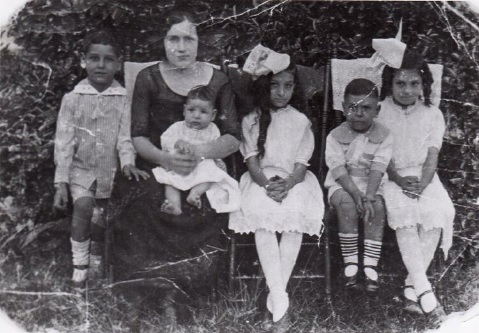
Audio Files
Interviews were conducted for The Lebanese in Mississippi, an MFA thesis by James G. Thomas, Jr. (2020).
Included in this section:
- Podcast, 4 episodes
- Interview segments with Lebanese Mississippians
See also the online exhibit: The Lebanese in Mississippi
-

01.1 Podcast, Episode 1: Leaving the Mountain
James G. Thomas Jr.
In this first segment, “Leaving the Mountain,” we’ll hear from Lebanese Mississippians Marie Antoon, Dave Sherman, Keith Fulcher, Al Katool, Mary Anne Lefoldt, Teresa Nicholas, Mary Louise Nosser, and Samir Husni. We begin with the question, “Why did your family emigrate from Syria?” and we’ll hear the stories that have informed their understanding of why their ancestors left the Middle East and traveled by sea to places across the globe that they knew little about and to places they had never before been.
-

01.2 Podcast, Episode 2: Coming to America, Making a Life in Mississippi
James G. Thomas Jr.
In this second segment, “Coming to America, Making a Life in Mississippi,” we’ll hear from Lebanese Mississippians Mary Tonos Brantley, Dolores Thomas Ulmer, Ellis Antoon, Mary Louise Nosser, Louise Abraham Wilson, Charles Shamoun, Marie Antoon, and Jim Angelo. I begin with the questions, “How did your family find their way to Mississippi?” and “What did they do once they’d arrived?” I’m learning that once they had arrived in Mississippi, they peddled wares from house to house until they had saved enough to open their own stores in town, becoming merchants like James Ellis (right) in Port Gibson.
-

01.3 Podcast, Episode 3: Living in the Jim Crow South
James G. Thomas Jr.
In the early decades of the twentieth century, whites and the Lebanese people in Mississippi rarely mixed socially, and although the Lebanese were eventually welcome at public schools, churches, and in public spaces, many exclusive organizations that had always been strictly “for whites only” remained so. For example, in colleges and universities across the state in the early 1960s, young Lebanese students found themselves barred from joining fraternities and sororities because of their Lebanese heritage. Fraternal organizations like the Rotary, Kiwanis, and Lions’ clubs were no different, and until around 1960, most country clubs in Mississippi still explicitly stipulated that Syrians and Lebanese be excluded from joining. Narrators in this segment describe life for the Lebanese in Mississippi during the state’s most segregated post-slavery era.
-

01.4 Podcast, Episode 4: Maintaining an Ethnic Identity
James G. Thomas Jr.
Although the first generations of Lebanese Mississippians wanted their children to be able to assimilate into American society in ways that they hadn’t been allowed, Lebanese parents and grandparents also wanted their children to retain a sense of their Lebanese identity. In this final segment, we’ll hear how some customs and traditions fell by the wayside while the Lebanese in Mississippi have been successful in maintaining others.
-

06.1 On his ancestors’ journey to and origins in America
Keith Fulcher
Many Lebanese Mississippians began their lives in America in New Orleans, and many others came through Texas border towns like El Paso.
-

06.2 On his understanding of why his ancestors came to America
Keith Fulcher
Keith Fulcher’s understanding of why his ancestors came to the United States include both oppression by the Turkish government in Syria and the collapse of the silk trade there.
-

06.3 On his own sense of ethnic identity
Keith Fulcher
Despite bad memories and the lack of desire to return to Lebanon, most Lebanese clung to their Middle Eastern heritage, identifying more closely with where they had come from than with where they had chosen to live.
-

06.4 On how food has helped create bonds and a sense of identity within his family
Keith Fulcher
Food has been essential to creating bonds and a sense of identity within Fulcher’s family.
-

06.5 On the importance of Catholicism
Keith Fulcher
“My grandmother may have been in Jackson and worked in S.N. Thomas Company. She also went to Gulfport as a young girl and lived with the Catholic nuns. So I don’t want to leave that out, that part of the story about who influenced my Lebanese family. They were extremely poor, I mean just like most Lebanese immigrants were on the Farris side of the family. My grandmother went and lived with the Catholic nuns and went to school in Gulfport. So, if not for the Catholic nuns there is really no telling what my family life would be because [. . .] my grandfather T. G. Nohra really couldn’t provide for them financially, so I know that the Sisters of Mercy in Vicksburg, St. Francis, let my mother and her siblings go to school free, and they were selected usually every year to get a new pair of shoes from the Salvation Army. So, you know, that means a lot.” -- Keith Fulcher
-

06.6 On the El Monsif to Mississippi Facebook page
Keith Fulcher
In this last clip, Fulcher talks about the importance of the El Monsif to Mississippi Facebook group.
-

07.5 Alfred J. Katool, Sr. talks about his father opening restaurants in Jackson
Alfred J. Katool Sr.
-

09.1 Pam Mayfield discusses her relationship to other ethnic groups in Vicksburg
Pamela Jabour Mayfield





































